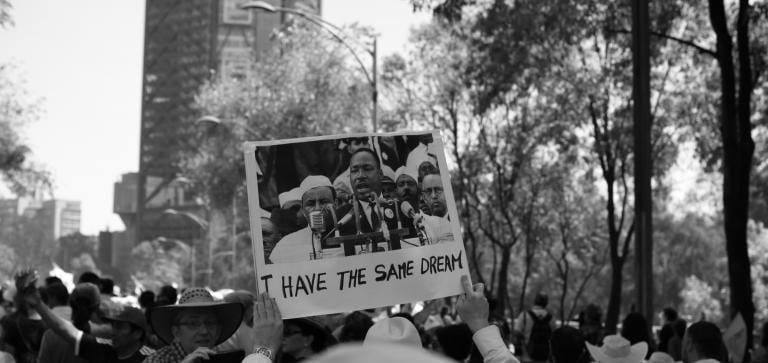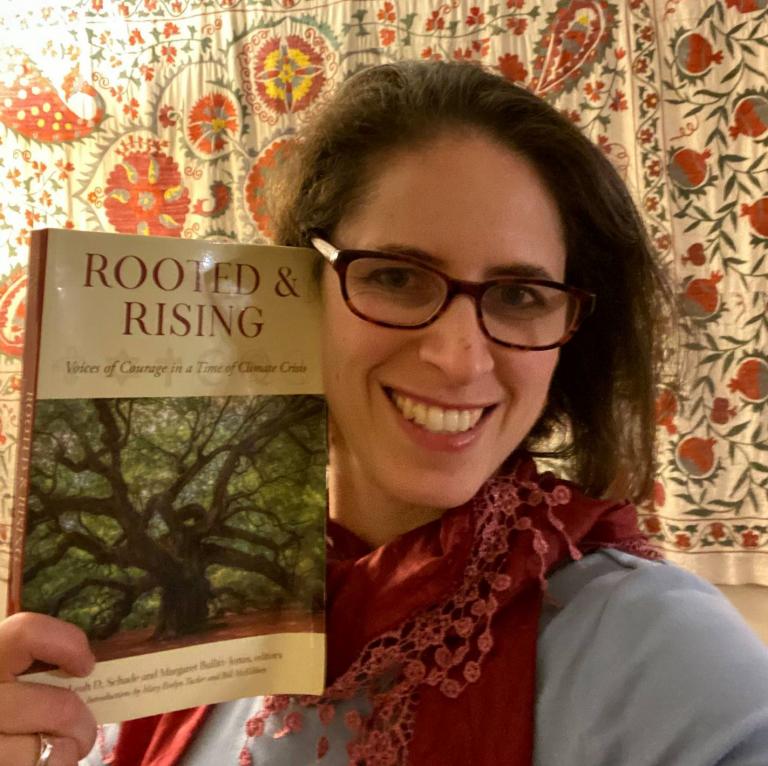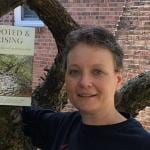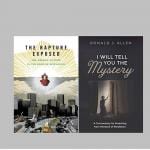Following God’s call can be exhausting and depleting. Isaiah 49:1-7 shows us sometimes we dream too small. Other times we dream too big.

Rabbi Shoshana Meira Freidman:
“As the May sun bounces off the hardhats of the workers at the construction site, I ignore the approaching policeman, duck under the barrier with fifteen other faith leaders, and sit with my legs dangling in the pipeline trench. For the first time in weeks, my body relaxes. I smile, pick up my ukulele, and begin to sing.”
This is how Rabbi Shoshana Meira Friedman begins her chapter in the book Rooted and Rising: Voices of Courage in a Time of Climate Crisis. She was part of a multi-faith grassroots effort in Boston to block a fracked gas pipeline in 2015 that threatened the safety of the neighborhood and would add yet more greenhouse gas to the climate crisis.
The road Rabbi Friedman’s act of civil disobedience started from a childhood dream of wanting to save the world.
“When my third-grade class took turns sharing what we wanted to be when we grew up, I said ‘environmental activist,’ and in those words made a sacred promise. In the way that only a small child can believe in her own power, I planned that by the time I died, all the world’s ecological crises would have been solved by my future self’s superhuman combination of scientific knowledge, charismatic leadership, and faithful activism.”
Pretty bold and audacious, isn’t it? When I read Rabbi Freidman’s words, I thought of this text from Isaiah 49:1-3:
The Lord called me before I was born, while I was in my mother’s womb God named me. God made my mouth like a sharp sword, I was hid in the shadow of God’s hand; God made me a polished arrow, I was hidden in God’s quiver. And God said to me, ‘You are my servant, Israel, in whom I will be glorified.’
Maybe you, too, can relate to that feeling of dreaming big as you answered God’s call for your life.
I’m thinking a lot about dreaming big as we celebrate Rev. Dr. Martin Luther King Jr. His famous words echo across the decades:
“I have a dream that one day right there in Alabama little black boys and little black girls will be able to join hands with little white boys and white girls as sisters and brothers. . . . I have a dream that my four little children will one day live in a nation where they will not be judged by the color of their skin but by the content of their character.”
Pretty bold and audacious, isn’t it? We celebrate Dr. King’s prophetic courage in the face of threats to his life. We draw inspiration from his sermons and speeches that lit the moral fire for change. And we lift him up as a model of strategic activism and unfailing faith.
But did you know that Dr. King also had doubts about his call?
He struggled in his spiritual journey for justice. He experienced fear, despair, and self-doubt in the midst of pressure and threats from the Civil Rights movement. Dr. King describes a moment of anguish one night seated at his kitchen table (from: Stride Toward Freedom: the Story of the Montgomery Bus Boycott):
“It seemed that all my fears had come down on me at once . . . And I got to the point that I couldn’t take it any longer. I was weak.”
Dr. King was ready to pull out of the fight.
Oh, how Isaiah knew that feeling: “But I said, ‘I have labored in vain, I have spent my strength for nothing.” (Isaiah 49:4)
Rabbi Friedman also knew that feeling. She recounted that as her personal vision for saving the planet grew clearer, so did the enormity of the problem.
“News about the [environmental] crisis only got worse. Overwhelmed by despair on a regular basis, I started to tune out . . . It all hurt too much to think about. And when I tried to take some kind of public action, I got stuck in self-doubt. What if it wasn’t the right action to take? What if it wasn’t effective? What if I failed? What if I inadvertently made things worse?”
Even after earning a degree in Environmental Studies, working with children at a summer camp, starting a classroom garden at an elementary school, and preparing for a career in environmental policy, her despair overwhelmed her.
“I hadn’t reckoned with the well of pain inside me,” she said. “If I heard a news story about, say, mountain-top removal, I felt a punch to my solar plexus. I could feel the fear in the wildlife as the explosions rang out, the awesome grief of the mountain rent apart. And I knew I was complicit, part of the destruction. That knowledge caused more pain. I needed to pay attention to that hurt, to work in spaces and with people who could make room for it, and who would support me in living in alignment with my values.”
This pain is what drove Shoshana back to her Jewish roots. She decided to go to rabbinical school to connect her faith with her call to care for the Earth. It was during a spiritual direction session where she realized the source of her pain. In that sacred promise she had made in third grade to save the Earth, she had made a promise that she simply could not keep. She was trapped inside an impossible vow.
Her dream, it turns out, was too big. Because she had tried to take on saving the world all by herself.
So her spiritual director helped her assemble a beit din, a rabbinic court of three of her most trusted teachers to perform hatarat nedarim for her – a Jewish ritual for the nullification of a vow. During the ritual, she shared her story, all of her dreams, all of her hopes, and all of her frustration, pain, and disappointment. Her teachers listened and recited the sacred words: “Mutarim lach, mutarim lach, mutarim lach. You are released. You are released. You are released.”
In that moment, she said, “I felt a sudden release of energy from that place of pain in my solar plexus. None of us knew what would come of the ritual, but something had shifted.”
Dr. King also experienced a moment of release.
He described that moment at the kitchen table with his head in his hands praying to God in the midnight hour after a phone call threatening to kill him and his family.
“’The people are looking to me for leadership and if I stand before them without strength and courage, they too will falter. I am at the end of my powers. I have nothing left.’ At that moment, I experienced a presence as I have never felt before. It seemed at that moment that I could hear an inner voice saying to me, ‘Martin Luther, stand up for righteousness. Stand up for the truth and lo, I will be with you, even until the end of the world.’ I heard the voice of Jesus saying still to fight on. He promised never to leave me, never to leave me alone.”
“And now,” says the prophet Isaiah, “the Lord says, who formed me in the womb to be God’s servant, to bring Jacob back to God, and that Israel might be gathered to God, for I am honored in the sight of the Lord, and my God has become my strength— God says, ‘It is too light a thing that you should be my servant to raise up the tribes of Jacob and to restore the survivors of Israel; I will give you as a light to the nations, that my salvation may reach to the end of the earth.'” (Isaiah 49:5-6)
Your dream is too small, says God.
You’re thinking about this circle of justice in this one place with this one group of people. But I’m sending you as a light to all people, not just your own community. Your dream is too small.
But your dream is also too big.
You’re trying to take this all on by yourself. You cannot do this without me. “Thus says the Lord, the Redeemer of Israel and his Holy One, to one deeply despised, abhorred by the nations, the slave of rulers . . . the Holy One of Israel, who has chosen you.'” (Isaiah 49:7)
It was in his moment of utter weakness that Rev. Dr. Martin Luther King Jr. found strength.
He realized he could not do this work alone – his dream was too big for one person. But he also realized that his dream was too small. “Martin Luther, stand up for righteousness. Stand up for the truth and lo I will be with you, even until the end of the world.”
King said that in this amazing moment with God, he experienced the presence of the Divine as never before. “Almost at once my fears began to go. My uncertainty disappeared. I was ready to face anything.”
And that is exactly what happened. King was ready to face anything. He pressed on in his fight for righteousness and truth – but he did it with his trusted friends, colleagues, and family. And he did it with God.
Yes, but . . . some will say.
Yes, but . . . it cost him his life. Yes, but . . . here we are more than fifty years later, and white supremacy is rising up once again in horrific ways. How can we not be discouraged?

Rabbi Friedman understands those questions as well. Yes, but . . . the climate crisis is getting worse, not better. Yes, but . . . species and glaciers and islands are disappearing right before our eyes. On that day when she found herself sitting in a pipeline trench in Boston, feet dangling, she strummed that ukulele and her voice sang out along with other faith leaders. They hoped to stop the pipeline. But then the police handcuffed and arrested them. Yet even in the darkened police transport vehicle, they kept on singing.
Even though they lost the fight against the pipeline, she keeps on doing this work. Why? How can she not be discouraged?
Drawing on an image in Paul Hawken’s book Blessed Unrest, she said, “We are part of an immune system rising up organically from the Earth itself. The response in West Roxbury was like the community mobilizing to remove a parasite. Yes, it’s a failure that the pipeline went in at all, but it would have been an even greater moral failure if the pipeline had gone in without a fight. Our act of civil disobedience said that even if the world is falling apart, we will not sit quietly on the sidelines and watch.”
What she has come to realize that that working for a livable climate is how she and other faith activists witness to God’s love for the world. “It’s how [we] show up with love for God and the world at this time in history . . . This was a revelation to me,” she said. “It was all about love.”
You see, love is the dream that is big enough. And small enough.
Love is the dream that reaches across a hurting planet and into pipeline trenches. Love is what inspires a little girl to make a sacred vow to save the earth. And love is what releases her to trust God and others so that she does not do this work alone.
Love is what envisions racial justice for a nation. Love is what inspires a pastor to lead a movement. And love is what releases him to trust God and others so that he does not do this work alone.
Perhaps you know what it feels like to be overwhelmed, to feel blocked, or stuck in fear of failure.
What Dr. King and Rabbi Friedman have taught me is that this work isn’t about success. It isn’t about strategies and tactics. “Of course, those are important,” says Rabbi Friedman, “but they are not the actual ground beneath our feet. The only ground beneath us is the love we feel for the world and our desire to be in service to God, or Love, or Life itself.”
Love is the dream that is big enough. And small enough.
This realization opened her heart and radically changed her life. “Climate activism became a devotional practice for me, a form of prayer instead of a series of failed attempts at saving the world. The hours I have spent in relational meetings and in marches, on email and on conference calls, crafting campaigns and speaking and singing at events – these have been hours of sacred service. They are my response to the suffering and to the crisis, and my response to being alive and grateful for my life. They are a way for me to serve God.”
If Dr. King could hear these words, I have no doubt he would shout an amen to that!
For what has God chosen you?
What is the way in which you have been called to be a servant of God, a servant of God’s people? How is your light shining for the nations?
As you do this work, remember who formed YOU in the womb to be God’s servant. Remember that God is your strength.
May love be your dream that is big enough. And small enough.
You can read more honest and inspiring stories of religious climate activists in Rooted and Rising: Voices of Courage in a Time of Climate Crisis, co-edited by me and my colleague Margaret Bullitt-Jonas.

Leah D. Schade is the Assistant Professor of Preaching and Worship at Lexington Theological Seminary in Kentucky. She is the author of Preaching in the Purple Zone: Ministry in the Red-Blue Divide (Rowman & Littlefield, 2019), Rooted and Rising: Voices of Courage in a Time of Climate Crisis (Rowman & Littlefield, 2019), and Creation-Crisis Preaching: Ecology, Theology, and the Pulpit (Chalice Press, 2015).
Leah’s latest book is a Lenten devotional centered on Creation: For the Beauty of the Earth (Chalice Press, 2020).
Twitter: @LeahSchade
Facebook: https://www.facebook.com/LeahDSchade/
Read also:
To Understand Martin Luther King Jr., Read Howard Thurman
Preaching Martin Luther King’s ‘Drum Major Instinct’ in the Trump Era













